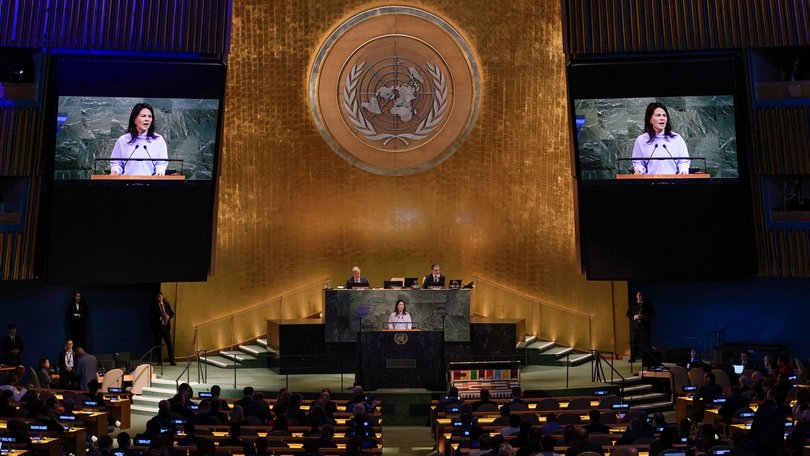AARON PATRICK: On its 80th birthday, the UN General Assembly looks tired, poor and ineffective
AARON PATRICK: Celebrating its 80th birthday this week, the global body created to prevent wars and other man-made catastrophes is weak and compromised, according to critics.

The United Nations auditorium where world leaders gather to debate, discuss and argue over global challenges was lit up with a blue hue on Monday to mark the institution’s 80th anniversary.
As presidents, prime ministers and other leaders from 193 countries listened, UN president and former German politician Annalena Baerbock recalled that the body was founded in the aftermath of two world wars and “the unspeakable horrors of the Holocaust”.
Founded with the promise of averting wars and other man-made catastrophes, the United Nations is today a weak and compromised organisation, critics say. It has played no significant role in efforts to end the wars in Ukraine and the Gaza Strip.
Sign up to The Nightly's newsletters.
Get the first look at the digital newspaper, curated daily stories and breaking headlines delivered to your inbox.
By continuing you agree to our Terms and Privacy Policy.Its early work creating a global agreement to combat global warming is fraying as big carbon emitters prioritise economic development over costly green energy.
Ideological shift
Struggling financially, the organisation is moving staff out of expensive cities such as New York and Geneva. The famous UN bureaucracy is being scaled back too. Some 20 per cent of employees could lose their tax-free jobs under a restructuring plan dubbed UN80.
The budget problems are the ultimate consequence of an ideological bias that has affected the UN over the past 80 years.
Most UN members remain poor by Western standards. Developing countries are more likely to support causes championed by the global left, including the largely successful campaign to isolate Israel diplomatically.
About 80 per cent of the UN’s members recognise Palestine as an independent nation, and were joined this week by Australia, a position the Israeli government regards as unfair given its main opponents wish to eliminate it.
Budget problems
Resentful at what it sees as entrenched opposition to American values and interests in the UN, the US is holding back funding to UN programs and the general budget. The new US ambassador, Michael Waltz promised last week to “Make the U.N. Great Again.”
The loss of the UN’s top donor has cut deep. Other big contributors, including China, Japan and the European Union, have not increased their payments to compensate. China chose to delay its dues payment this year too.
The UN still has supporters. Former Australian diplomat Ryan Neelam worked on climate policy at the UN’s New York headquarters in the early 2000s. Some problems are so universal, such as weapons proliferation, that only a global organisation can come up with effective solutions, he concluded.
“Any regional approach to try to solve these issues would be piecemeal,” he says. “I am a believer in the necessity of the UN system even though I have seen up close its shortcomings.”
The US does not agree. Last week the State Department published an “America First” strategy for global health that would use country-to-country relationships rather than international agencies such as the World Health Organisation to fight pandemics and other health problems. While many doctors and experts around the world support the WHO, opponents say it is too influenced by China to be fully independent.
President Donald Trump is due to speak to what is known as the general assembly today. He is expected to express a desire for peace in the Middle East while backing Israel. Without US support, Palestine cannot become a UN voting member.
Anthony Albanese, who formally declared Australian recognition of Palestinian statehood on Monday, is unlikely to secure a meeting with the President this week, according to the White House.
While the snub is embarrassing for Australia, there is someone else even more important also waiting for his first chance to sit down with the President: UN Secretary-General António Guterres.

